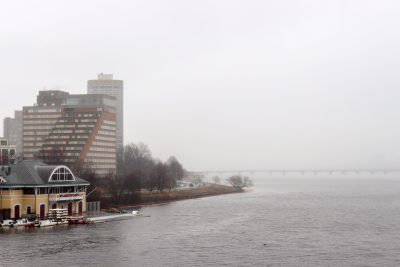
The first nor’easter of the school year caused heavy rains and flooding at Boston University Saturday, prompting questions about how BU deals with such extreme weather events.
Rain from nor’easters often blows into buildings and causes flooding or damage, BU spokesperson Colin Riley said, leading to potential safety and property issues.
Nor’easters are most frequent and most violent between the months of September and April, according to the National Weather Service.
Representatives from different departments at BU meet for monthly emergency planning meetings to discuss potential steps that can be taken to improve the way the university deals with natural threats, Riley said.
Riley said the university makes sure to communicate to the students any expectations of bad weather conditions that they need to prepare for.
“We do communicate when there is a expectation that there will be serious weather that they need to prepare for,” Riley said. “Ironically, students, it seems, are happy when we have a snow day, but we are well prepared to clear snow and paths and entrances and exits so that the business of the university can continue.”
Assistant to the Dean of Students Katherine Cornetta wrote in an email that BU Facilities Management and Planning staff members have a lot of experience with inclement weather and know what the various campus buildings need for each weather variety.
For example, she wrote that the brick walkway outside the George Sherman Union sometimes experiences severe flooding, an issue that facilities employees resolve quickly.
“The Facilities staff here is always right on it when it does happen – so quickly that most people don’t even realize it happens!” Cornetta wrote.
Beyond improving campus sustainability, BU’s Climate Action Plan will keep the campus safe during extreme weather events, Cornetta wrote.
The best things students can do to ensure safety during bad weather is to report any problems they see in their residence halls, Cornetta wrote, ranging from leaks in the ceiling and problems with windows to more serious building-wide issues.
“If you see an issue before a big storm, make sure you take the proper measures to report it so there is a chance to get it fixed prior to a storm,” Cornetta wrote. “If you have a problem during a storm, make sure to report it and any damage to your personal belongings as soon as possible.”
Students can contact the BU Facilities staff or reach out to their Residence Life staff members for help, Cornetta wrote.
Several BU students said they feel that BU could improve on alerting students and helping students get around campus during extreme weather.
Matthew McGunigle, a junior in the College of Arts and Sciences, said he appreciates the emergency warnings BU sends out during inclement weather.
However, Lidiya Dubrova, a junior in the Sargent College of Health and Rehabilitation Sciences, said she thinks the university should notify students of extreme weather events beyond snowstorms.
“I have to check the weather myself,” Dubrova said. “If it’s pouring out, I only find out because I check the weather … but it would be nice if they sent out warnings for really big thunder [and] wind storms, because right now they only send out warnings for the snowstorms in the winter.”
Sonja Caballero, a sophomore in the College of Communication, said she thinks BU Shuttle service should be increased during inclement weather if possible.
“Sometimes I can’t get to class,” Caballero said, “and if I end up going to class, I’m soaked or freezing, covered in snow and stuff like that.”
CAS sophomore Sarah Bedell also said she thinks bus service could be better in extreme weather conditions.
“If it’s dangerous conditions, they should make use of the BU buses more,” Bedell said. “If you’re not going to cancel class, then you have to have more shuttles for the kids to use, because you can’t expect these people to walk in dangerous conditions.”
Caballero also said she thinks the university should provide more resources for students who aren’t from the Boston area.
“I wish there was more information for students who weren’t from New England,” Caballero said, “because I feel like they have no idea what they weather is like here.”


















































































































